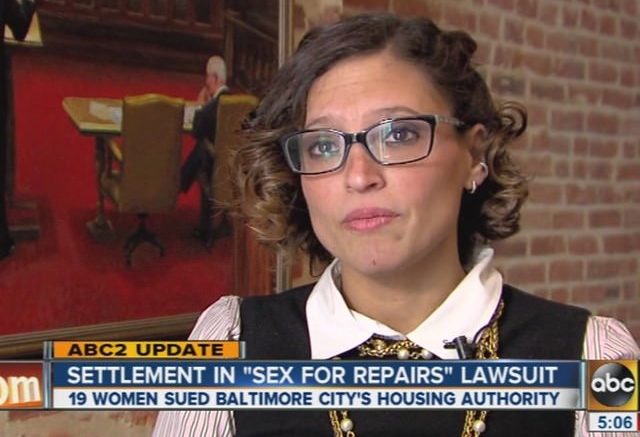A woman who was allegedly sexually assaulted by a city employee lost an $80,000 settlement because of a paperwork glitch.
Didi—a nickname to protect the privacy of a sexual assault victim—is one of dozens, maybe hundreds, of public housing residents who were harassed or sexually assaulted by city maintenance employees in a sex-for-repairs scandal this year. But while more than 100 women were set this fall to receive settlement payments of up to $100,000, Didi was denied because her application form arrived late.
“I mailed them in time as far as I know,” Didi says.
The so-called sex-for-repairs scandal erupted in the fall of 2015, when more than a dozen women complained in a lawsuit that maintenance workers employed by Baltimore Housing for years had refused to do repairs and maintenance on their public housing units unless they acquiesced to sex—or because they complained about sexual harassment and assault.
Calls for the resignation of Baltimore Housing Director Paul Graziano followed, and in January of 2016, the city and plaintiffs announced a settlement: The complainants would become part of a class action suit and victims would be a paid a total of up to $7.95 million. The payments were divided into five classes according to the severity of the behavior.
Class A victims—women who had been physically abused and had acquiesced to having sex with the maintenance men—would get $100,000 each. Three women were part of this class.
Class B victims—who had been sexually assaulted but effectively fought their attackers off, and thereafter received no maintenance or repairs—would be paid $80,000. There were nine women listed in that group.
Class C was defined as women who fought off their attackers but did see subsequent repairs to their apartments. There were no women named as part of that group, whose members were offered $60,000 each.
Class D victims—women who were verbally harassed but not physically assaulted, and whose apartments were not maintained—were due $40,000 each. There were five listed there.
Class E victims—defined as people who were sexually harassed but not assaulted, and whose apartments were maintained—were due $20,000 each under the settlement’s terms. There were two women listed as part of that class.
The settlement agreement called for a search for other class members, with a stipulation that the names of those added to the settlement would not be made public. A Claims Administrator was appointed, and he sent a package to more than 8,300 current and former public housing residents, inviting them to submit a claim. The form was two pages, and once sent it would supposedly prompt a phone call and interview by one of the administrator’s assistants, who would assess the claim for payment.
The deadline to complete all this was Aug. 26.
Didi filed suit in April to “intervene” in the settlement. Represented by Attorney Landon White, who was admitted to the Maryland Bar after the initial case was filed, Didi demanded $3 million.
“They used to call me Miss City Hall because, you know, I call up on them when they don’t fix nothing in my house,” Didi says. For nine years she lived in Latrobe Homes, raising four children and sometimes running a daycare center there.
Didi says a maintenance man she knew as J.B. came one day to fix an interior door and kissed her neck. She pushed him out, and the door never got put back on its hinges. She says it later fell on her son and injured him.
She complained to management about it, to no avail, she says. Then when she needed a leaky toilet fixed, Baltimore Housing sent J.B. back. “He tried to put a move on me again,” she says in her court complaint. When she got him out of her unit, J.B. tried to come back in, claiming he’d left his keys in her bedroom.
Didi said she had the locks changed after that.
“All this happened before the [class action] case even came out,” Didi says in a phone interview. “I should have been one of the first people on it. I really suffered.”
Didi says she got so anxious about J.B. and Baltimore Housing’s failure to reign him in that her mother had to pay her bills, walking the payments into the central office because Didi was afraid to even step inside there. “Anxiety is like all the way up to the ceiling, you know?” she says. “I just been through a lot.”
On Aug. 1, Federal District Court Judge George L. Russell, III rejected Didi’s motion to intervene, ruling that there was no legal point to the motion. He said she could instead apply for the class settlement as part of the B group due $80,000.
Didi got her package and filled it out by Aug. 19. But, apparently, White did not drop it into the mailbox until Aug. 26, the day of the deadline. The claims administrator did not receive it until several days after that. Too late.
On Oct. 31, Didi received word that her claim had been rejected. She says White never told her it was because her form sat on his desk for a week before being postmarked. “He said he mailed it off in time,” she says. “I don’t understand why this even happened because I did my part right.”
White has filed a motion to reopen the case, claiming that by getting the claim postmarked on the deadline, he met common law requirements under contract law. He also says that the Aug. 26 deadline was never made clear, and that Cary Hansel, the lawyer who represented the plaintiffs’ class, and Heffler Claims Group, the claims administrator, rejected his client improperly because of her earlier attempt to intervene in the case.
He thinks there may be other victims besides his client.
Hansel says that’s nonsense. “I will tell you at the outset that my heart goes out to her,” he says, adding that his firm had every incentive to sign as many plaintiffs onto the class as possible.
A total of 142 people applied, and 112 were eventually included in the settlement, Hansel says. The 30 that didn’t make it fell broadly into two groups: those whose claims of sexual harassment predate the three-year statute of limitations, and those who, he says, “had no problems [with sexual assault by maintenance men] and said that very honestly.”
Didi, he says, is a unique case.
Hansel is reluctantly opposing Didi. He says that by the time her lawyer filed his latest motions, in November and December, the $8 million had already been disbursed. Reopening the case now could hurt the other members of the class. In a filing, Hansel includes an email exchange between himself and White. “I am trying to understand what happened here so that I can offer my opinion to the claims administrator if it is sought,” he wrote to White on Oct. 31. “I still do not understand why there was a delay. Are you telling me that you just got busy and didn’t send the application for a week?”
Source: www.citypaper.com



